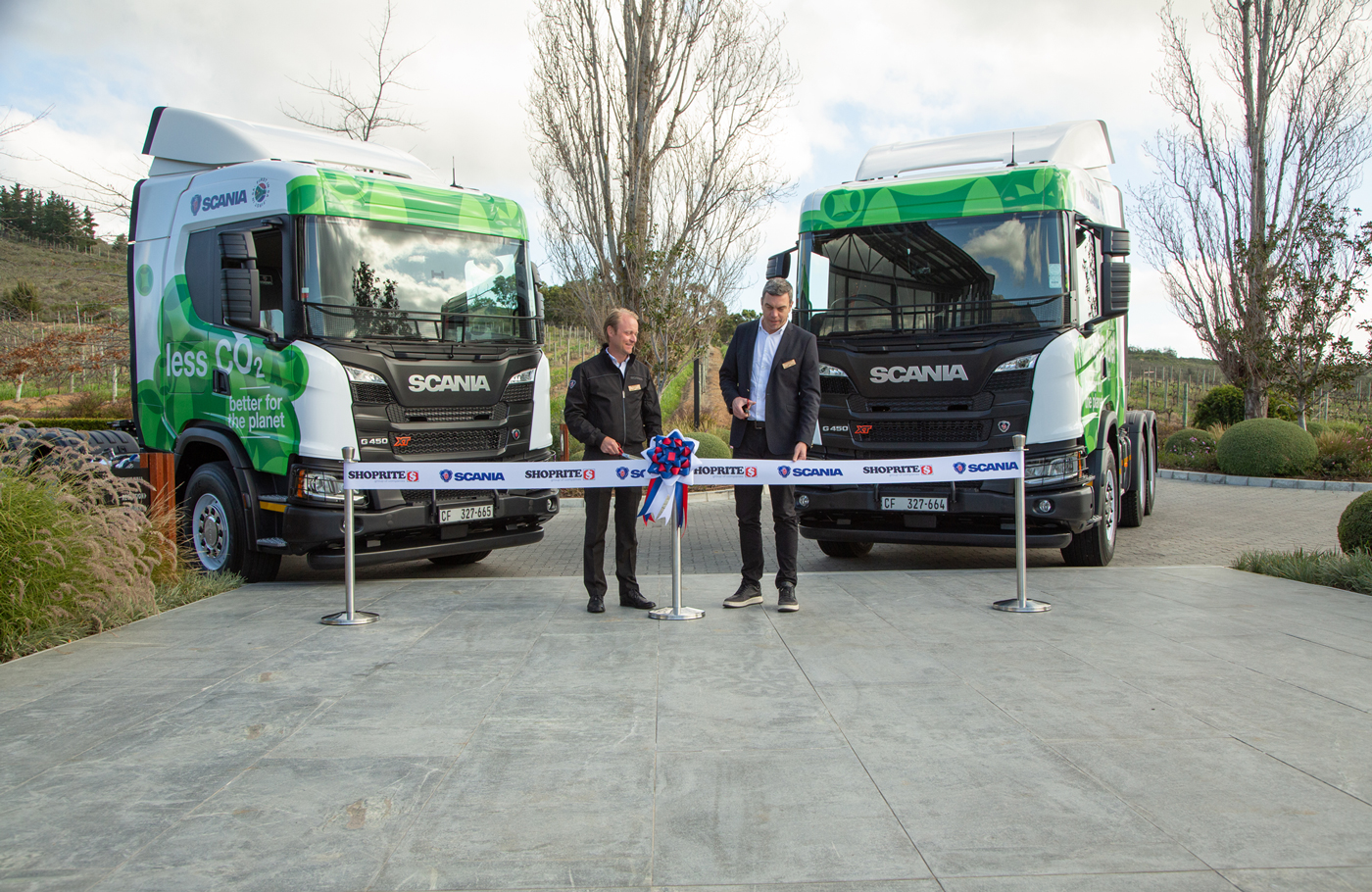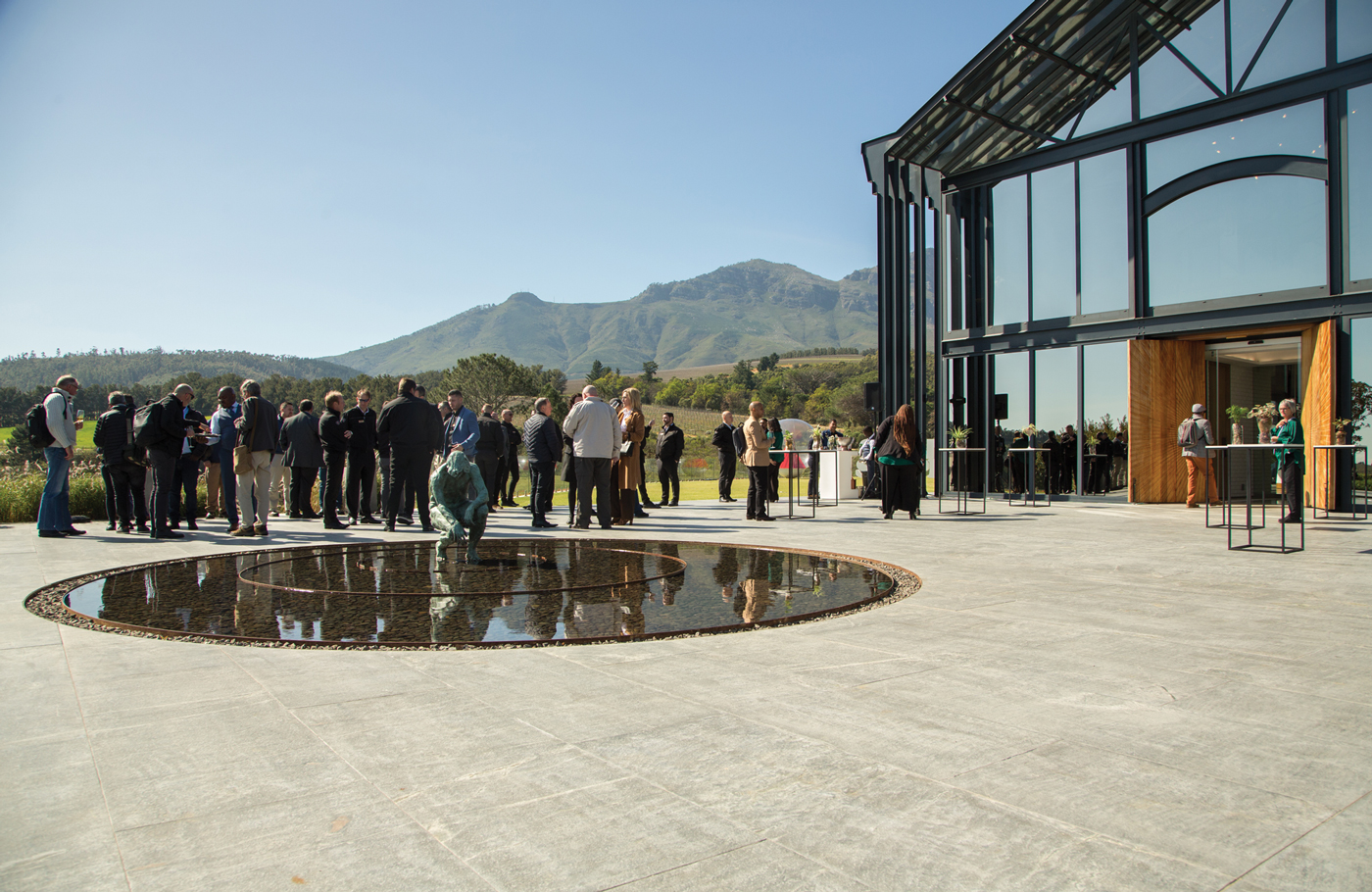A perfect pairing
A perfect pairing
In one of this year’s most significant South African vehicle handovers, the Shoprite Group has acquired over 100 of the most fuel-efficient trucks in Southern Africa. These Scania Euro 5 trucks provide a proven fuel saving of around 10%, along with lower CO2 and NOx emissions. DEBORAH RUDMAN joined the dignitaries for the handover in Stellenbosch.
The Oxford English Dictionary defines sustainability as “being environmentally sustainable; the degree to which a process or enterprise is able to be maintained or continued while avoiding the long-term depletion of natural resources”.
Last month, Stellenbosch winery Quoin Rock hosted the eagerly awaited Scania Shoprite Euro 5 handover. There could hardly have been a better venue in which to showcase a future-forward collaboration. The theme throughout the event was sustainability: from the seasonal, local ingredients in the sumptuous four-course lunch – beautifully served and accompanied by excellent Quoin Rock wines – to the ethos behind Scania’s technology and Shoprite’s vision.
Presentations by various Scania Southern Africa (Scania SA) and Shoprite Group representatives, who were introduced by enthusiastic MC Jo-Ann Strauss, were thoughtfully informative.
Managing director of Scania SA, Erik Bergvall, welcomed the industry and media attendees. Mark Erasmus, Scania SA general manager, outlined the evolution of the Scania-Shoprite partnership, while Johnny-Ray Basset, Scania SA key accounts manager, elaborated on the synergies the companies share.
Andrew Havinga, Shoprite’s chief supply chain officer, took the audience through the numbers: with 2 900 stores, servicing some 24-million customers, the group’s world-class supply chain includes 29 distribution centres covering 673 843 m2.
This provides Shoprite with a competitive advantage in the retail industry to consistently deliver on its business promise of everyday low prices. Key to its supply chain is a highly sophisticated transport route planning and scheduling system, which optimises energy efficiency and deliveries to the group’s stores.



During the 2020/2021 financial year, Shoprite’s fleet travelled close to 90 million kilometres and delivered more than 350 million cases of products to its stores. Operational and supply chain efficiency play a critical role in ensuring that the group remains Africa’s most affordable and accessible retailer, while reducing its environmental impact. “We are relentless in our efforts to improve efficiencies in our supply chain, as these measures are key to extending our customers’ spending abilities,” Havinga pointed out.
These efforts include changing to more fuel-efficient trucks and installing solar PV on trailers, as these trucks can be switched off while the refrigeration and tailgate lift continue to run on solar power.
“By further increasing the energy efficiency of our trucks and training our drivers on how to reduce fuel consumption, we are able to lower the comparative impact of the distance our fleet travels every year,” Havinga continued.
The group’s overarching aim? To keep prices down and the corporate eco-footprint as light as possible; what makes eco-sense also makes business sense. “It’s the commonality that brings Scania and Shoprite together,” he noted.
Scania was the first major heavy commercial manufacturer to commit to the United Nations Sustainable Development Goals and to achieving the Paris Agreement targets of limiting global warming to 1.5 °C above pre-industrial levels.
“The good thing about these targets is that they draw a line in the sand for us, creating a clear route to reducing greenhouse gas emissions,” explained Bergvall. “This commitment includes emissions from our customers’ vehicles when in use, so to achieve our sustainability goals, we need to partner with like-minded companies like Shoprite, who share our desire to create a better future for those who come after us. The Euro 5 engine platform offers customers proven 10% fuel savings, coupled with lower CO2 and NOx emissions.”
Sustainable transport solutions that fuel customer profitability are the driving force behind Scania’s partnership with Shoprite, which has acquired 100 of Scania’s New Generation trucks powered by Euro 5 engines – the Euro 5 G450 A 6×4.
To date, Scania has conducted 45 one-month tests with several different clients across varied applications using its Euro 5 vehicles. In all cases, the Euro 5 unit has been more fuel-efficient than the customer’s existing trucks.
Scania’s partnership with the Shoprite Group has been a five-year journey. “At face value, we are two very different companies operating in two very different industries, but we share a commitment to driving sustainability across our business ecosystems. Our partnership with Shoprite is pioneering the way to a more sustainable future that will yield great benefits, not only to the transport industry but also to our economy, people, and the environment,” explained Bergvall.
“Euro 5 compliance was non-negotiable for Shoprite. We are happy that we could prove that our Euro 5 vehicles are an economically viable solution for them, delivering unparalleled fuel efficiencies and better aerodynamics,” he continued.
Shoprite’s transport system is extensive, with a requirement for optimal performance in order for the group to maximise cost efficiencies. “Shoprite values data as much as we do,” noted Bergvall. “Data has driven our sustainability journey and allowed us to track, record, and analyse our customers’ operational information to ensure we are able to constantly support both their sustainability and financial goals.” This data is also used to measure Scania’s performance against science-based carbon reduction targets.
“When we first started talks with Shoprite, we had both travelled very different roads to get to where we are today. But these roads were always destined to cross because we share so much in common. We share sustainability goals, we are deeply commited to Southern Africa’s development and bettering the lives of all who live here, and very importantly, we are both obsessed with innovation,” explained Erasmus. ”I know that Shoprite’s vision is to remain Africa’s most accessible, affordable, and innovative retailer, and that the company is innovating on many fronts, across all areas of the business.”
While innovation and sustainability were clearly top of mind in the purchase, there were other features that helped to convince Shoprite. “These trucks come with a number of awesome features that met Shoprite’s objectives. The first of these are safety points in the cab, and safety is of the utmost importance to Shoprite. Scania trucks have incredible features that increase driver safety, like our EBS brakes, hill hold system, lane departure warning system, rain sensor, and adaptive cruise control,” Basset pointed out.
”But having said all that, the fact is our trucks are only as safe as the drivers’ safety protocols. We have provided Shoprite drivers with extensive driver training over the past few years, and will continue to equip drivers with the skills and knowledge they require,” he revealed.
In a discussion after the formalities, Johan Foley, Scania SA’s demo and training manager, noted that one of the stand-out features of the Euro 5 trucks is the driver cab: it’s been made super-comfortable for long-haul driving, while providing an array of hi-tech features to assist and correct driver behaviour.
Emissions (and therefore pollution) have been sharply reduced, thanks to that Euro 5 drivetrain. As Foley pointed out, you could stand next to a Scania Euro 5 truck while its engine is running and detect no trace of fumes.
The Shoprite Group’s fleet currently consists of 903 trucks and 1 360 trailers, of which 928 are fitted with solar panels, and it will be growing its fleet of fuel-efficient Euro 5 trucks annually, with an additional 140 units planned by the end of 2023.
It’s truly heartening in these challenging times to observe the strong belief held by both parties in the long-term future of South Africa. Recognising and developing the country’s potential is part of their shared ethos – for the benefit of business, communities, and individuals.
Published by
Focus on Transport
focusmagsa






